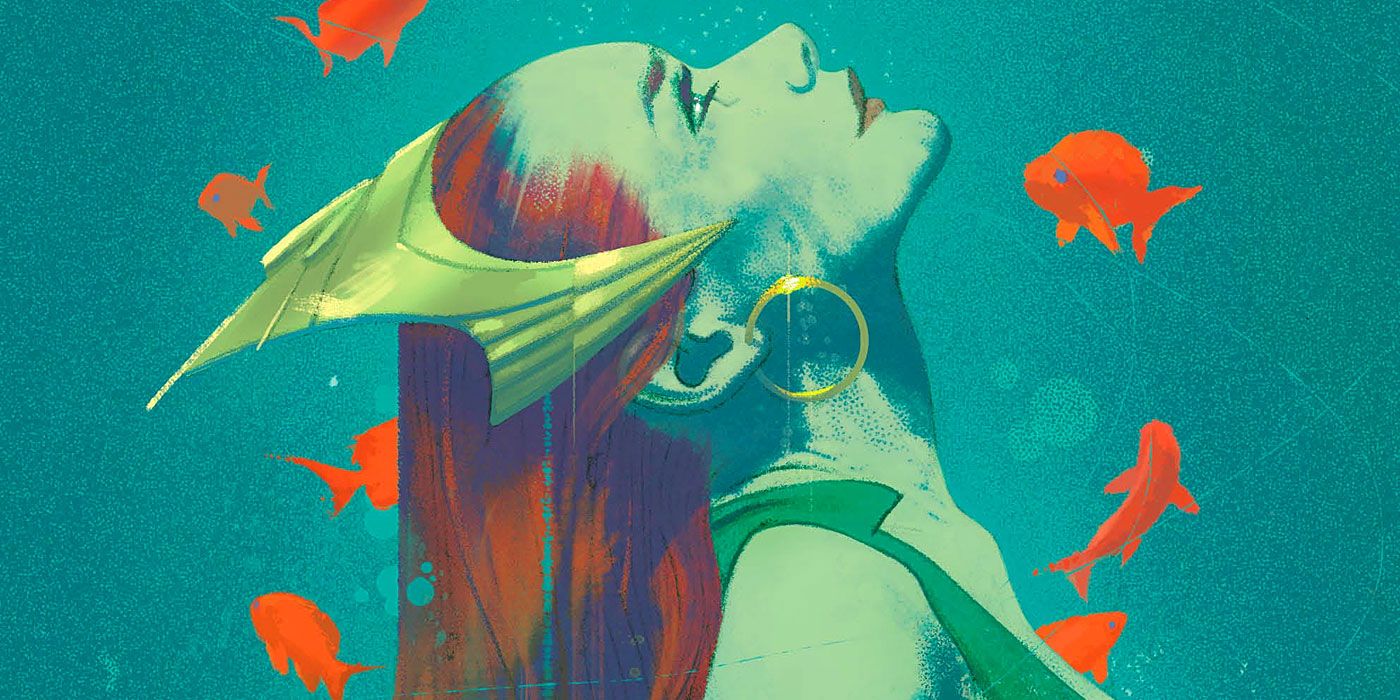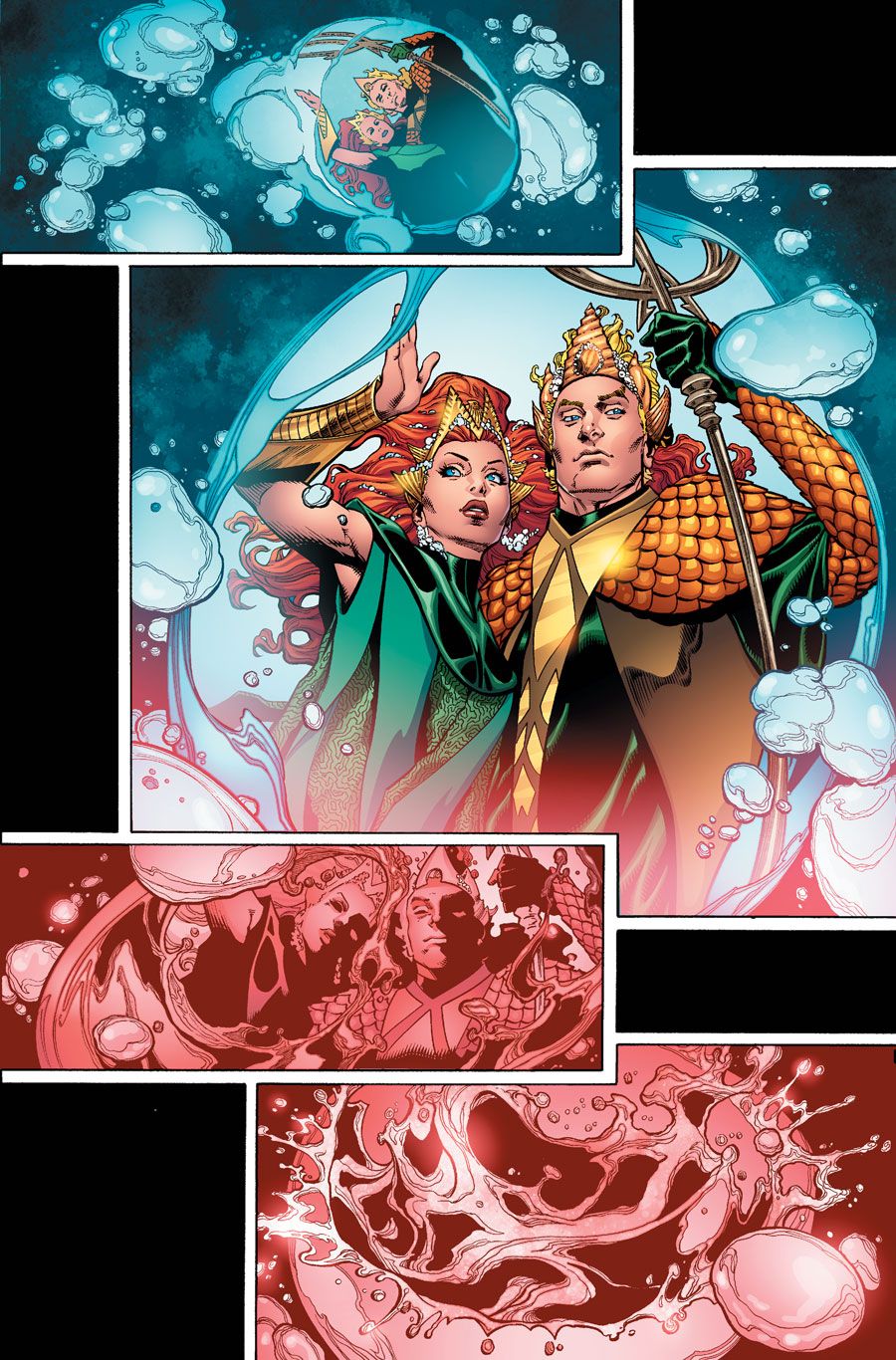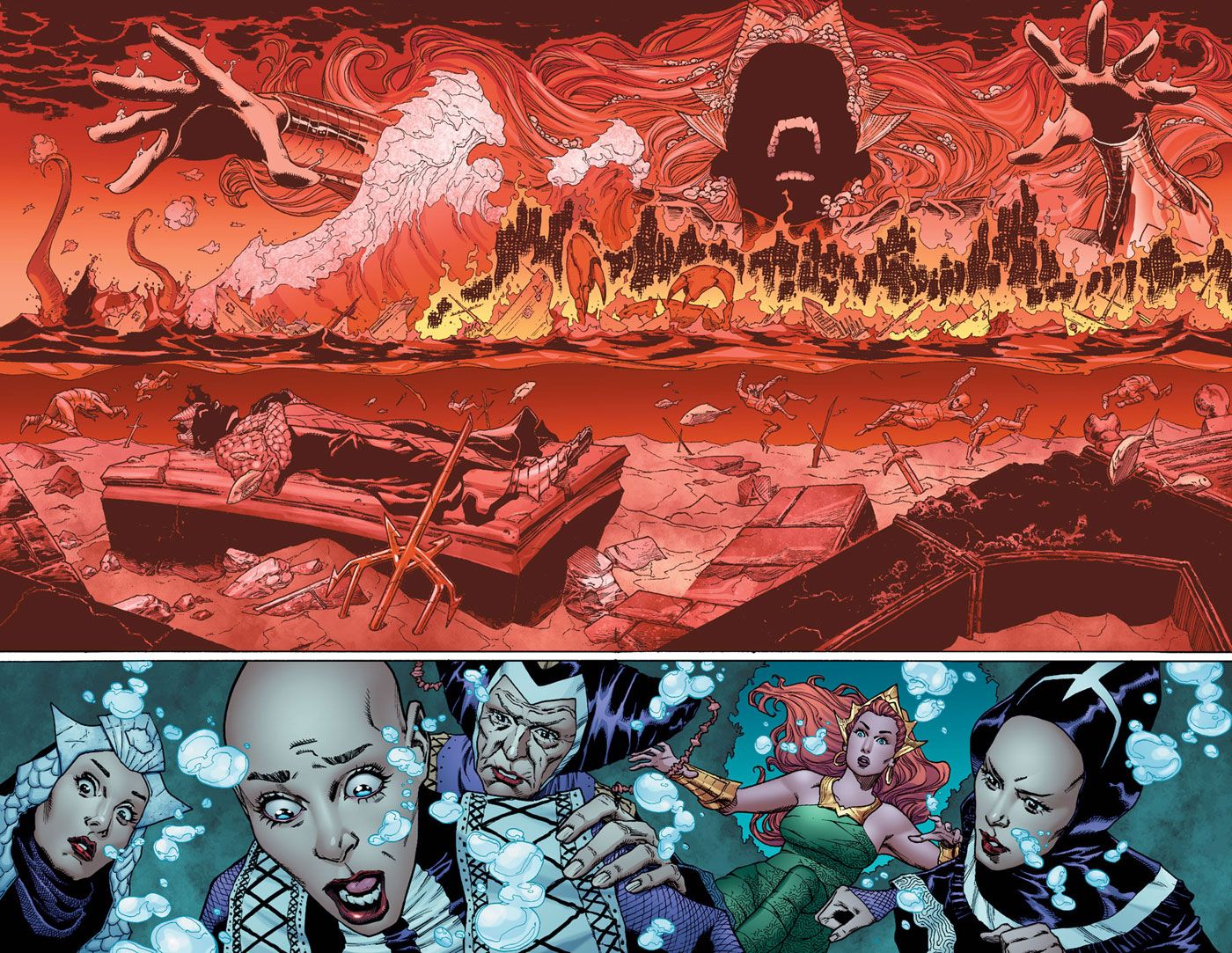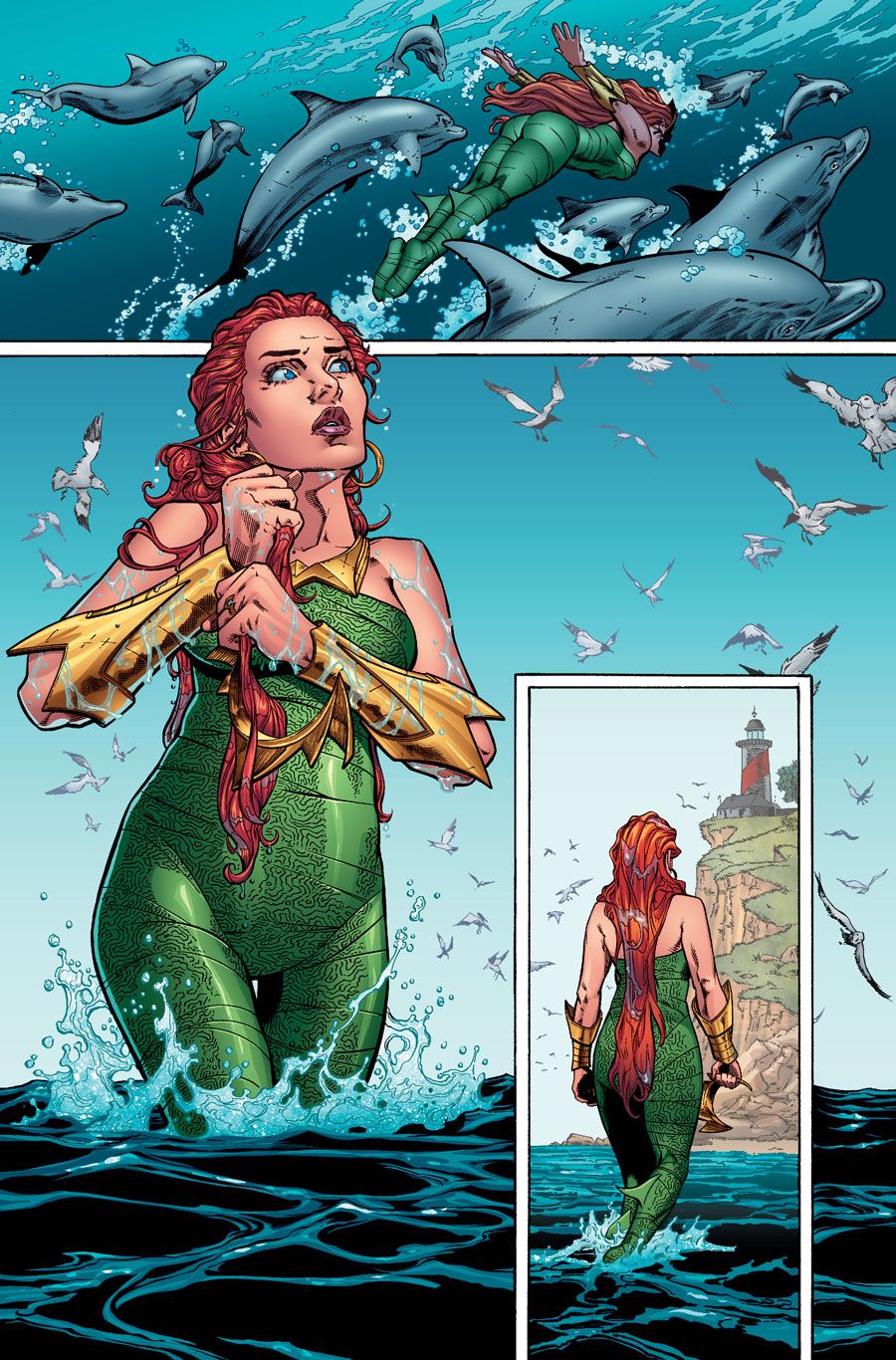SPOILER WARNING: This article contains major spoilers for "Aquaman" #10, on sale now.
When you're writing "Aquaman," it makes sense to go deep with your leading man. But Dan Abnett, the writer of "Aquaman" since its Rebirth relaunch, has looked beyond his titular character. As a result, he's not only provided Arthur Curry with a broader outlook and more global understanding of inter-world politics the writer has also expanded the mythos of Atlantis while creating a new version of Black Manta, who is a far greater threat than the helmeted hood could have ever imagined.
RELATED: James Wan Dishes On Aquaman and Mera’s Classic Romance
CBR spoke exclusively with Abnett to discuss his run to date with a specific look at the Mera-centric issue "Aquaman" #10, illustrated by Bradley Walker and on sale now from DC Comics.
Abnett shared his thoughts on Mera, who he says is far more than a love interest for Aquaman, and also revealed in-depth information about the Widowhood, the mysterious and possibly mystical band of widowed women that have been tasked with testing Mera to see if she is worthy of taking Arthur's hand in marriage thereby becoming Queen of Atlantis. The fan favorite writer also teased details about how badly Aquaman was injured at the hands of the Shaggy Man at the end of "Aquaman" #9, and why that might be the least of Arthur's worries, what with a newly focused and recently freed Black Manta, now leading the secret terrorist organization N.E.M.O.
CBR: There was a damning line in "Aquaman"#5, a few issues back, that has stuck with me. George Gantry, the White House Chief of Staff, says, "It's not like he's an important member of the League. He's not beloved like Big Blue or the Amazon. He's the fish guy. He's there to make up the numbers." As a long-time Aquaman fan, that hurts. When are we going to be able to move away from the narrative that Aquaman is the "fish guy"? He has to have proven himself by now.
Dan Abnett: I consider him to be a Premier Division DC hero, and also it's quite clear in the publishing history of DC, that's he's right there. With Rebirth, I wanted to recast the attitude toward him. In pop culture, beyond the comics, there is still an attitude that Aquaman is a joke hero – the butt of so many jokes. Because I have been following a storyline since the beginning of the Rebirth run about getting recognition for not only Aquaman but Atlantis as a nation, to take them both seriously and lose some of that fear that the surface holds for them, it's quite useful to marry that with Aquaman's own perceived reputation. It's the way that he thinks that the world thinks about him. That's really the story that we are dealing with at the moment in a big way. Without giving away spoilers, there is going to come a point – provided that everybody survives that long – where we can stop hitting that particular bell every single time. And stop making him look quite so sorry for himself but it's still important to do now because of the material that we're dealing with.
I'm Canadian, so I live in the shadow of the United States like so many others, and we are watching the presidential election between Hillary Clinton and Donald Trump with a very close eye. And, of course, as a Brit, you are no stranger to turbulent political climates when you consider the recent Brexit referendum. With all of this political uncertainty around the world, it certainly makes the unrest between Atlantis and the surface dwellers all the timelier and intoxicating.
I think it absolutely is, and think it's quite interesting. I've been working on "Aquaman" for quite a while and it surprised me that some of things that I thought were quite good were also quite relevant and contemporary stories. I like the idea of handling Aquaman in his own book as much as a ruler and a king and a politician as a superhero. That's a very important strand of Aquaman. Analyzing what kinds of stories that we could tell, the relevant ones seemed to chime very closely to things happening in the real world in a general sense. One of things that surprised is me is how modern events, current events are overtaking what I'm doing. [Laughs] I'm planning stuff out and as I do them, they look almost tame by comparison. However, perhaps that's inevitable. Whether by accident or design, I seem to have my finger on the pulse. Sometimes the real world moves faster than even bi-monthly publishing.
While Aquaman is obviously front and center in this series, we also are getting all kinds of Mera, which is great. Currently, in the story, Mera is being tested by the Widowhood to see if she is worthy of being Queen of Atlantis. But you and I both know already that she is more than worthy, right?
Absolutely. Mera is such an important character, as far as I am concerned. And she is also one of the most underrated DC characters as far as I am concerned. She's never got that Lois Lane fame and I think she deserves to have it. She's a spectacularly strong character – and I don't mean that literally though she is – and she's very interesting indeed. As far as I am concerned, the book is called "Aquaman" and it's obviously about Aquaman but Mera is absolutely there and she almost overshadows Aquaman at times because she's such a strong character. The moment that I started thinking about stories and started planning stuff, I realized what an important role that she would have to play. She's really the co-star, rather than the love interest. It's a very important distinction. Mera is absolutely pivotal to all of this. It's been fun, particularly in the last few issues, to open up Atlantis a little bit and flesh it out and give it a bigger supporting cast – there is some more fun characters coming along – just to give a sense of the nation that Aquaman is representing so strongly. There are definitely different opinions about the surface and the other things that are going on but Mera is absolutely front and center as his companion, his counsel and his partner in his adventures.
"Aquaman" #10 is nominally a mirror issue. It's focused on Mera, and she's the cover star. It's a good reflection of what an important character that she is. Readers really seem to like her. I never get the sense that readers are saying: "Oh, it's Mera stuff again. I'm not interested. Bring back Aquaman." They seem to like her.
I love the Widowhood. They're very Shakespearean. They remind of the Three Witches from "Macbeth." What was the inspiration for their introduction into Atlantean mythology?
When you have a fictional, fantasy nation like Atlantis, to give it a sense of cultural complexity is a good thing because then it feels real rather than just a bunch of merpeople who turn up behind Aquaman occasionally in interesting costumes. This is a living culture with not all of one mind. They have different concerns and that's makes Aquaman's position as the king much more interesting. He's not just representing one people, who are by default thinking the same thing. He has to listen to all and get involved in the intrigue and the rivalry. He has to make comprises like any great politician needs to. And the Widowhood was an idea to give a sort of spiritual quality to Atlantis to have this sort of sisterhood. There like nuns or almost like a religious order but they're not specifically religious nor or they specifically magical but they have sort of sense of solemn elders of the city. They are supposed to be, all of them, women who have lost family members, often husbands, in the defense of Atlantis. They are symbolic widows, there to look after the health – in inverted commas – of the city state, of the nation. Clearly, as we are seeing right now, there is more to them than meets the eye.
As I say, I created them and put them in story partly to create some interesting drama and intrigue, partly to add to the fabric, to the texture of the Atlantean culture to make it more interesting. But also, because it did occur to me that Mera is such a strong character that she is sort of hard to fault. She's hot tempered and there are characteristics of her personality that need to be reflected but generally speaking, when I thought about it, I couldn't think about anybody not wanting her to be queen because she's obviously such a strong candidate. She's this great figure. So I wanted to introduce something that made the process of her betrothal to Aquaman rather more complicated and complicated in unexpected ways. And they're obviously revealing now that there are potential obstacles to the path of true love. And not so much her marrying Arthur because she loves him but her marrying Arthur and becoming queen. I thought it was about time that she came about a problem that she couldn't solve easily with her usual power-set. If you remember, she and Arthur agreed to the idea that she should be tested to see if she was suitable queen material simply to deal with another problem. That is to say, some members of Atlantean society that we've seen have thought of Arthur as too progressive and not respecting the old traditions of Atlantis enough. Simply in doing that, what can it hurt? They're saying, "We'll do that because it will make people appreciate that we do admire the traditions of Atlantis." This has actually led to a much more complicated and convoluted situation, again, as revealed in "Aquaman" #10 in very shocking ways.
And these shocking ways lead Mera to visit Amnesty Bay to share the latest revelations with Arthur only to find that Aquaman has been seriously injured – and possibly dead – following his confrontation with Shaggy Man – one of my all-time favorite DCU villains.
Yes, you're right. Two weeks ago, in "Aquaman" #9, [Arthur] did stop the Shaggy Man -- but at what cost? There is a huge question mark whether he's crippled or even dead. I like the idea that Mera was completely oblivious to all of this, because she's been sequestered with the Widowhood so she has no idea that this is going on. And when she finds out in "Aquaman" #10, she takes herself away to think about what's said to her to contemplate what's been said, she still has no idea. I wanted the readers to be pleading for someone to tell her that Arthur, at the very least, is badly hurt.
"Aquaman" #10 has this air of mysticism hanging over it. There is prophecies and clairvoyants going on and strange utterances that may or may not make sense and may or may not be predictions of the future and as she goes along, she encounters these and scoffs at them but in doing so, she becomes – if she wasn't already – a very major player in the very, very direct actions that are going on. Rather than it being Aquaman dealing with every problem and answering every question, Mera comes across certain vital pieces of information that are going to make all of the differences as the story progresses.
And as we, the readers, know, the prophecies and clairvoyants that have Mera and the Widowhood so upset have nothing to do with the proposed marriage of Mera and Arthur, at least so far, and everything with the plotting and machinations of Black Manta as the new leader of N.E.M.O.! My love for Black Manta may be even deeper than my love for Aquaman. I grew up watching "Super Friends," and Black Manta was always the coolest member of the Legion of Doom. The helmet, the voice -- he's the ultimate super villain!
Yes! You're right. I wanted the opening storyline of the book to pit Aquaman against Black Manta. If there is a drawback to Black Manta at all, it is that he is so single-minded. Whatever his agendas might have been in the past, his primary goal for the longest time has been vengeance against Arthur. He's become a sort of Shakespearean figure in the single-mindedness of that endeavor. Rather than just perpetuate that and have them go through the rigmarole of him trying to kill Arthur in vengeance and Arthur beating him. I wanted to do something with that so those opening two issues, "Aquaman" #1 and 2, I really wanted to hash that out and have Arthur confront the issue head-on and almost, almost as it were, talk Manta out of it. To show Manta the sheer futility of his single-mindedness with which he was going about things.
I thought it was a strong moment and there was a genuine sense that Manta himself recognized the pointlessness of what he was doing. It was sort of a really shocking moment for him but I trying to talk him out of the vengeance, Arthur actually plants a seed in Manta, which is you are an incredibly capable man, why are you wasting your life on vengeance against me when you could be doing so much more? To use the Shakespearean idea again, Aquaman has sort of created his nemesis. He has created an even worse version of Manta than the one that existed before. He's given him the inspiration to seize upon opportunities, particularly the opportunities presented to him when he was sprung by N.E.M.O. to actually broaden his agenda beyond the simple, singular vengeance into something really, really rather terrifying that has sort of global consequences.
I wanted to make Manta a greater villain with a greater reach and a greater threat than he has ever been before in this story without changing who Manta was – without reinventing Manta in such a fundamental way that he wasn't Black Manta anymore. I wanted him to be the same character but written larger, more ambitious, more confident, more dangerous and again, I love that lingering irony, without him fully appreciating it yet, that Arthur has done that. He's made his villain worse by trying to do something good and trying to take that hostility away. Arthur has unleashed a monster on the world.
"Aquaman" #10, by Dan Abnett and featuring art by Bradley Walker, is available now.




